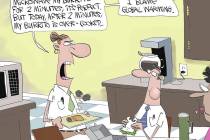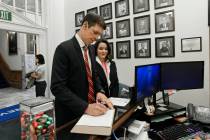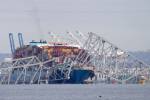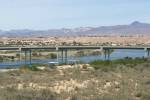On roads, Clinton and Trump may both be wrong
When Hillary Clinton and Donald Trump agree on something, it’s worth a closer look. Maybe they’re both wrong.
Such is the case with their proposed federal spending binge on “infrastructure” — roads, bridges, airports.
Clinton’s plan is for “up to $500 billion in federally supported investment,” of which $250 billion over five years would be direct federal spending.
In his recent Detroit Economic Club speech, Trump promised, “We will build the next generation of roads, bridges, railways, tunnels, seaports and airports that our country deserves.” He’s spoken of spending “at least double” what Clinton proposes, and of funding the plan by borrowing money — that is, selling bonds.
Already, the plans are attracting praise from gullible journalists. “The economic need for more infrastructure is obvious,” declares Derek Thompson, writing in the Atlantic under a headline that declares Clinton and Trump “both right.”
In The New Yorker, John Cassidy uses the same language: “At a time when many of the nation’s transport links, electricity grids, water systems, and other essential bits of hardware are crumbling, the need for repairs and upgrades should be obvious to all.”
Here is a pro tip for readers and voters: When someone advocates spending hundreds of billions of dollars of your tax money (or tax money from your children, in the case of money that will be borrowed) on their projects, demand that they offer a justification stronger than merely declaring the need is “obvious.”
Because what’s “obvious” to the politician who wants his picture taken at the ribbon-cutting for the project and the construction union guys who are going to get paid Davis-Bacon Act “prevailing wages” for the job may not be so obvious to the travelers inconvenienced by endless construction or to the taxpayers who would prefer to spend the money fixing the “infrastructure” of their own houses, rather than having it taxed away to pay for some politician’s bridge to nowhere.
An emphatic reminder of one problem with government infrastructure spending came in a recent New York Times column about the online retailer Amazon investing in the use of aerial drones for package delivery. The Times technology columnist, Farhad Manjoo, echoed the conventional wisdom about how “the transportation infrastructure in the United States is aging,” demanding “urgent and expensive fixes” to “roads, waterways, airports.” Then he reported that “all of Amazon’s current investments in shipping … depend on the traditional shipping infrastructure. All, that is, except for drones — which explains why they are integral to Amazon’s vision of the future of retail.”
Got that? Rather than waiting for the politicians to fix the roads and bridges, one of the most successful and innovative companies, Amazon, is going the drone route. By diverting package delivery to robotic aircraft instead of truck drivers, that may end up reducing the burden on roads.
Another fast-moving technological advance, self-driving cars, may similarly change our expectations about roads by turning frustrated drivers into relaxed riders who can use their commute time more productively. Who can predict how self-driving cars might improve traffic congestion by reducing collisions?
Because government, especially at the federal level, does nearly everything more slowly than the private sector, its decision-making about investment tends to be backward looking. During the Bill Clinton presidency, officials spent a lot of time talking about the need to put cabling in classrooms for the Internet. Now wireless networks make all those wall plugs obsolete.
The best way for the federal government to improve infrastructure would be by easing regulations. Those rules make it costly and slow for private investors or for state and local governments to fix old roads, bridges and tunnels or to build new ones. Even so, some states are stepping up to fund their own projects, as California did in replacing the San Francisco Bay Bridge.
For fixing transportation problems, it’s not obvious at all that politicians are better than technology or private ingenuity.
Ira Stoll is editor of FutureOfCapitalism.com and author of “JFK: Conservative.” His column appears Sunday.























